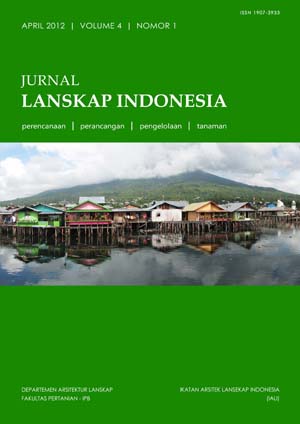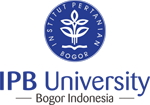EVALUASI KEBERLANJUTAN MASYARAKAT BADUY DALAM BERDASARKAN COMMUNITY SUSTAINABILITY ASSESSMENT
Abstract
Nowadays human settlements are using a large amount of fossil fuels and natural resources that produce pollutions. Environment quality is degrading each year causing many disaster occurring all over the world including Indonesia. Today
settlements are continuously being built by new technologies which is advanced in techniques and materials, but lack of environmental consideration. Societies who are concerning in environmental degradation can lead to the unsustainable living in the world has developed a community called Global Ecovillage Network (GEN). GEN concluded that to save the world from an extinction people, way of live need to be changed in a more environmentally friendly manner. This way of live is popularly known as ecovillage. People need to be more economic, efficient and live harmoniously with all organism in the nature. Global Ecovillage Network (GEN) has developed a tool called Community Sustainability Assessment (CSA) which defined level and ways to be more sustainable in a community.
Indigenous people, The Inner Baduy community as an indigenous people, is well known since 16th century and still exists until now. They have developed systems from their longstanding experience as their local wisdoms than can adapt to their environment in a sustainable manner.
The aim of this study is to emphasize the importance of traditional knowledge in terms of providing low input energy, water and wastes to the natural resources in a settlement scale. The study results are concept and level of sustainability of Inner Baduy community based on CSA.
Downloads
This journal permits and encourages authors to post items submitted to the journal on personal websites or institutional repositories both prior to and after publication, while providing bibliographic details that credit, if applicable, its publication in this journal. However, after the article is submitted and published in this journal, it is fully copyrighted by the Jurnal Lanskap Indonesia or JLI. If excerpts from other copyrighted works are included, the author must obtain written permission from the copyright owner and give credit to the source in the article. Then, the writer or reader is allowed to copy, share, and redistribute articles/material in any form. But it must still include the appropriate source and credit because the article in this journal is licensed by Creative Commons Attribution 4.0 International License (CC BY 4.0).
I. Proposed Policy for Journals That Offer Open Access
Authors who publish with this journal agree to the following terms:
- Authors retain copyright and grant the journal right of first publication with the work simultaneously licensed under a Creative Commons Attribution License that allows others to share the work with an acknowledgement of the work's authorship and initial publication in this journal.
- Authors are able to enter into separate, additional contractual arrangements for the non-exclusive distribution of the journal's published version of the work (e.g., post it to an institutional repository or publish it in a book), with an acknowledgement of its initial publication in this journal.
- Authors are permitted and encouraged to post their work online (e.g., in institutional repositories or on their website) prior to and during the submission process, as it can lead to productive exchanges, as well as earlier and greater citation of published work (See The Effect of Open Access).
II. Proposed Policy for Journals That Offer Delayed Open Access
Authors who publish with this journal agree to the following terms:
- Authors retain copyright and grant the journal right of first publication, with the work after publication simultaneously licensed under a Creative Commons Attribution License that allows others to share the work with an acknowledgement of the work's authorship and initial publication in this journal.
- Authors are able to enter into separate, additional contractual arrangements for the non-exclusive distribution of the journal's published version of the work (e.g., post it to an institutional repository or publish it in a book), with an acknowledgement of its initial publication in this journal.
- Authors are permitted and encouraged to post their work online (e.g., in institutional repositories or on their website) prior to and during the submission process, as it can lead to productive exchanges, as well as earlier and greater citation of published work (See The Effect of Open Access).



























